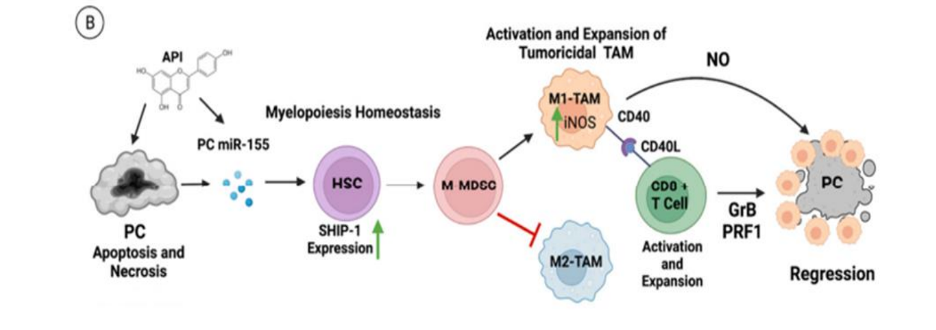Advantages:
- Proposes a method that aids in the therapeutic intervention of Pancreatic Ductal Adenocarcinoma
- Administering therapeutic agents, such as apigenin, potentially improves anti-tumor responses
- Method of monitoring helps track the progression and regression of the disease
Summary:
Pancreatic Ductal Adenocarcinoma (PDAC) is one of the most commonly diagnosed forms of pancreatic cancer and yet, it is one of the most aggressive of all cancer. Conventional treatments are ineffective for PDAC patients due to expansion and recruitment of immunosuppressive myeloid cells in the tumor microenvironment (TME) leading to tumor progression, metastasis and chemoresistance. Src homology inositol phosphatase-1 (SHIP-1) is a master regulator of myeloid cell development and function which can control tumor immunity outcomes. A natural substance called apigenin (API) has shown to improve SHIP-1 expression in mice with pancreatic cancer by suppressing the expression of PDAC-induced microRNA-155 (miRNA-155) that correspond with an increase of tumoricidal myeloid cells in the TME to promote tumor regression. The inventors propose a method for diagnosing and treating pancreatic cancer that involves measuring levels of miRNA-155 and SHIP-1 (in patient samples) and administering apigenin (API) to help increase anti-tumor immune responses.

The therapeutic use of the bioflavonoid API induces apoptosis and necrosis of PDAC cells and causes a decrease in miRNA-155 in the pancreatic tumor. This reduction correlates with an increase in SHIP-1 gene and protein expressions that result in the expansion of monocyte-myeloid derived suppressor cells (M-MDSC), which coincides with the development of tumoricidal macrophages (known as M1-TAM). These tumoricidal M1-TAM have increased CD40 expression which interacts with CD40L on CD8+ T cells, resulting in M1-TAM activation, production of iNOS/NO and an overall increase in anti-tumor immunity. This is signified by the release of granzyme B (GrB) and perforin (PRF) as well as the robust activation of anti-tumor immune responses (cytotoxic CD8+ T cells), leading to PDAC regression. Cancers (Basel). 2022 Jul 25;14(15):3613.doi: 10.3390/cancers14153613.
Desired Partnerships:
- License
- Sponsored Research
- Co-Development